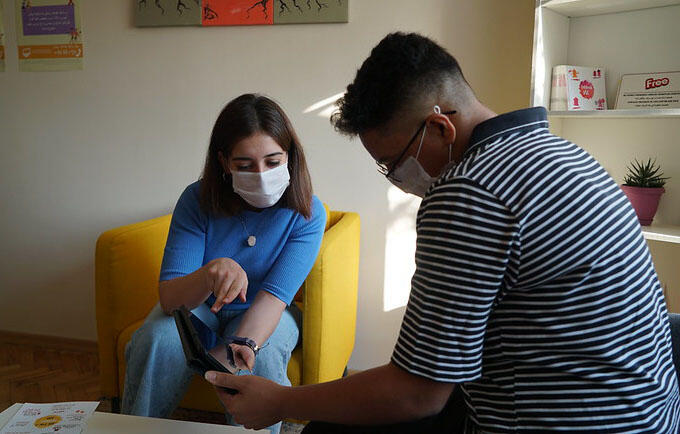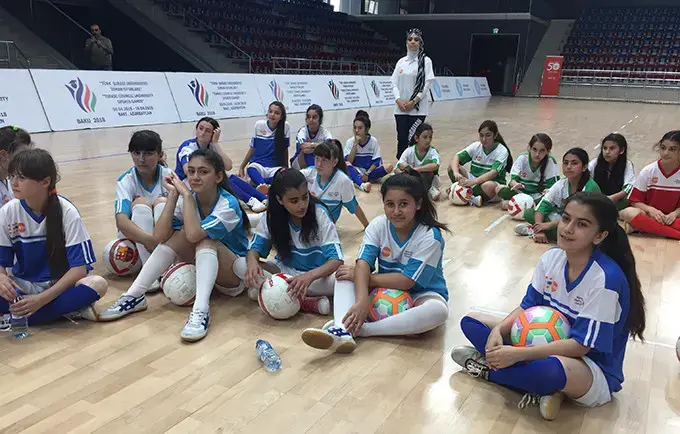ISTANBUL, Turkey — “They gave me your address and said that maybe you can help me. I’m stuck in New York and cannot get my antiretroviral therapy.”
When Aina*, a woman from Central Asia who is living with HIV, wrote that message to the Facebook page of a UNFPA-supported hotline in the spring of 2020, she was frightened. The COVID-19 pandemic had begun to spread in the United States, where she had been living for two years after escaping from an abusive partner. Her health was starting to deteriorate, and she didn’t know if she could get the medications she needed without encountering the same stigma and violence she had fled back home.
With the fastest-growing rates of new HIV infections in the world, the Eastern Europe and Central Asia region is facing a double pandemic, and people living with HIV are among those most vulnerable to the disruptions of services and supplies caused by COVID-19.
“There are many more women and girls like Aina in our region who suffer consequences of stigma and discrimination because of their HIV status, experience violence and fear for their lives,” said Andrey Poshtaruk, UNFPA Regional Advisor on HIV/AIDS.
Since 2010 there has been an increase of 72 per cent in the number of new HIV cases in the region, and a 24 per cent increase in the number of AIDS-related deaths, according to the UNAIDS Data book for 2020. Prevention efforts are underfunded in most countries, and more than a third of people in the region who are living with HIV and know their HIV status are not receiving treatment.
“Key populations and their sexual partners are disproportionately impacted, accounting for 99 per cent of new HIV infections in 2019. High levels of stigma and discrimination faced by lesbian, gay, bisexual, transgender and intersex (LGBTI) people and people living with HIV impede the provision of effective combination HIV prevention services,” the UNAIDS Data book said. “High levels of physical, sexual and emotional violence towards women and girls are also significant barriers to HIV services.”
Levels of stigma and discrimination are so high in some countries that around 70 per cent of people surveyed would not purchase vegetables from a shopkeeper living with HIV, according to the UNAIDS Data book.
The COVID-19 pandemic and related quarantine measures have only compounded these challenges. A rapid situation assessment carried out by the Eurasian Coalition for Health, Rights, Gender and Sexual Diversity (ECOM) found that COVID-19 has had a dramatic negative impact on access to HIV services and the volume and coverage of services offered. Among LGBT NGOs working in the field of HIV prevention and on other sexual health issues in the region, ECOM found that:
- 60% had completely stopped their offline (physical outreach) activities
- 39% had reduced their HIV testing services
- 27% had reduced provision of condoms and lubricants
- 52% were unsure about their ability to continue operating in the future
ECOM also found, however, that “the majority of organizations are continuing to operate and are looking for ways to adapt to conditions under quarantine,” primarily by transferring services online.
The regional youth-led movement Teenergizer, for example, conducted 47 online support groups for 314 HIV-positive adolescents aged 14 to 23 in Kyiv, Ukraine; Osh and Bishkek, Kyrgyzstan; and Almaty, Kazakhstan, between May and September 2020. Peer consultants trained by Teenergizer and psychologists partnering with the group additionally provided over 1,000 online consultations to adolescents and young people in the Eastern Europe and Central Asia region.
The ART HELP Hotline that Aina reached out to is another example of this kind of innovative, adaptive response. Launched in April by the Eurasian Women’s Network on AIDS (EWNA) with support from UNFPA’s Regional Office for Eastern Europe and Central Asia, the hotline utilizes social media to help people living with HIV and key populations who have difficulties receiving antiretroviral therapy and reproductive health and gender-based violence counselling and services due to the COVID-19 pandemic.
“I did not have insurance, and I was afraid to go to a clinic because I did not know whether it would be anonymous and confidential. I was afraid that my secret would be revealed in this new country, and I would once again experience persecution and disclosure of my HIV diagnosis,” Aina recalled in telling her story to EWNA.
But when she contacted the hotline, Aina said, “I got a reply quickly, the women responded very warmly and helped me get in touch with the right people in New York, who assisted to resolve my issue.”
Thanks to the help she received from the hotline, Aina was able to consult a doctor at a health centre for HIV-positive people that provided her with an interpreter and a full range of sexual and reproductive health care. The centre also assisted her in accessing the insurance she needed to resume her antiretroviral therapy, as well as in applying for a place in social housing.
Her situation is not an uncommon one, according to a forthcoming report on women, HIV and COVID-19 in the Eastern Europe and Central Asia region that was carried out by EWNA with support from UNFPA, UNDP and UNAIDS.
“Many women migrants found themselves without access to antiretroviral therapy for an indefinite period during the pandemic, as they were unable to return to their home country,” the report concluded. Access to this lifesaving treatment has also been hampered for non-migrants due to COVID-19-related restrictions on travel and transportation.
Based on 50 in-depth interviews conducted among women from community-led organizations in the region from June to August 2020, the report found that many difficulties experienced by women with HIV and those from other vulnerable population groups have worsened as a result of the pandemic. Many women with HIV and their children who already lived below the poverty line are facing circumstances as dire as starvation and homelessness. Stigma and discrimination against HIV-positive and drug-dependent women, and against sex workers and trans women, further limited their access to help in escaping the violence they are experienced more frequently under lockdown.
With new cases of COVID-19 growing once again in many countries in the region, the EWNA report calls for governments to address systemic problems of access to HIV prevention and treatment, and to provide women with HIV with targeted social support.




